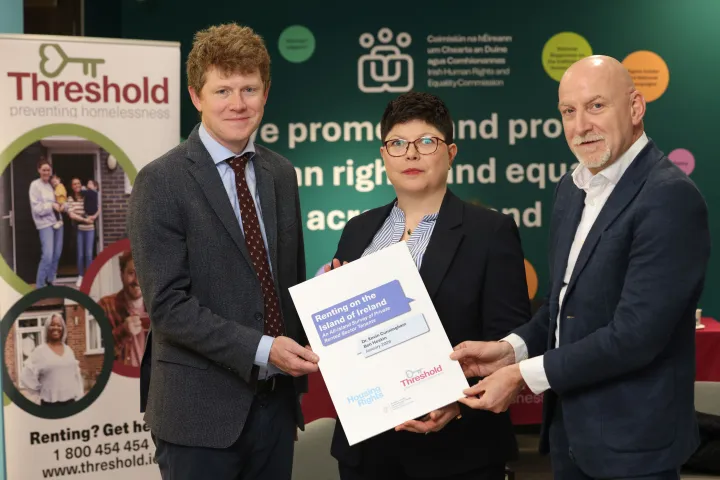Demand for private tenancies in Northern Ireland is at an all-time high.[1] Renters face stiff competition when applying for homes. Some renters are struggling to arrange a viewing or get their applications accepted.
There are reports that some landlords and agents will not rent to tenants with children and pets. Our helpline is getting more calls from tenants confused about whether landlords can make rules about who they rent to.
At the moment, there are no laws that explicitly stop landlords from making these kinds of policies. However, landlords and agents who apply blanket policies could be indirectly discriminating against some prospective tenants.
Anti-discrimination legislation in Northern Ireland
There are a number of anti-discrimination laws that apply to the provision of services in Northern Ireland including:
- Sex Discrimination (NI) Order 1976
- Fair Employment & Treatment (NI) Order 1998
- Disability Discrimination Act 1995
- Race Relations (NI) Order 1997
- Equality Act (Sexual Orientation) Regulations (NI) 2006
- Northern Ireland Act 1998
These laws aim to prevent discrimination when members of the public access goods, facilities, and services. Equality legislation in Northern Ireland protects consumers from discrimination on the grounds of:
- disability
- gender
- race
- religion or belief
- sexual orientation
There are several types of discrimination people can experience when accessing goods and services.
Direct discrimination versus indirect discrimination
Direct discrimination means that a service provider treats a person worse than others because of a characteristic that is protected under the law. For example, because of their gender or ethnicity. This can include:
- refusing or deliberately failing to provide a service
- providing lower quality service than usual
- providing a service on worse terms than is normal
However, service providers must also make sure not to indirectly discriminate against groups of people. Indirect discrimination happens when rules or policies look the same for everyone but disadvantage protected groups.
For example, a restaurant with a blanket rule not to allow any dogs. This could be indirect discrimination against disabled people who need the help of service dogs.
Indirect discrimination can be lawful if the service provider can prove that the rule is a proportionate way of reaching a legitimate aim.
Indirect discrimination in the private rented sector
Access to housing and accommodation are services covered by anti-discrimination legislation. This means that landlords and agents must make sure their policies do not discriminate against protected groups of people.
Refusing to rent to people with children or pets is unlikely to be direct discrimination. Neither of these groups of people is protected by anti-discrimination legislation. However, landlords should be careful when applying these blanket policies as they could be indirectly discriminating against renters.
Any policy not to rent to families with children could be indirect discrimination on the grounds of gender. This is because women are more likely to have children than men.[2] Similarly, any policy not to rent to people with pets could result indirectly discriminate against disabled people with service animals.
It's important to remember that in some circumstances it might be fair to apply these policies. For example, if a very small apartment has no outdoor space, it may be fair to decide it's not suitable for a large dog.
Rulings on indirect discrimination in the private rented sector
Housing charity Shelter recently helped private tenants bring landlords and agents to court because they were indirectly discriminated against.
The cases involved prospective tenants on benefits. The landlords in question refused to rent the properties because of this. The renters had shown they could afford the rent and had been good tenants in the past.
Shelter argued this was indirect discrimination. This is because women with children and disabled people are more likely to receive help with housing costs. These county court cases were successful. The court ruling confirmed it is unlawful to refuse to rent to people because they claim benefits.
The courts did not find any legitimate reason for the landlords and agents why to apply the policy. They agreed it indirectly discriminated against protected groups of people.
Shelter also helped a tenant in making a complaint to the Property Ombudsman in England. Their complaint was based on a landlord’s decision not to rent to a family with children. The Property Ombudsman upheld the complaint. The Ombudsman agreed that policies not to rent to families with children breach their code of conduct as not all customers were being treated equally.
The Ombudsman did state that these policies might be appropriate if the accommodation was too small or not suitable for children.
Challenging discrimination against renters in Northern Ireland
These cases are not binding outside of England. However, the points raised apply equally in Northern Ireland.
It is reasonable to expect that courts in Northern Ireland will follow the same reasoning if they hear similar cases. It is likely that blanket policies indirectly discriminating against protected groups would be considered unlawful.
The Minister for Communities agreed this is a matter that the courts must decide on.
“A county court Judge in England recently ruled that 'No DSS' rental bans are against equality laws. While the ruling is not binding, I would be opposed to landlords or letting agents operating any such policy, as this in my view would be discriminatory. Ultimately, however, this would be a matter for the courts to decide upon.”[3]
Similar cases will need to be heard by Northern Irish courts to confirm that these practices are against the law.
Get help with discrimination in the private rented sector
It's important for tenants, landlords and agents to understand how equality legislation applies to the private rented sector.
Any person refused services by an agent or landlord who feels they are being discriminated against should get expert advice from Housing Rights.
Landlords and letting agents concerned that they may be operating unlawful policies about who they rent to can get specialist advice from Landlord Advice.
Footnotes
[1] Ulster University, 'Performance fo the Private Rental Market in Northern Ireland, H1 2022, Issue 19: https://pure.ulster.ac.uk/en/publications/performance-of-the-private-rental-market-in-northern-ireland-h1-2-2
[2] National Health Statistics Reports, Number 179, 10 January 2023: https://www.cdc.gov/nchs/data/nhsr/nhsr179.pdf
[3] http://aims.niassembly.gov.uk/questions/printquestionsummary.aspx?docid=31 6932


